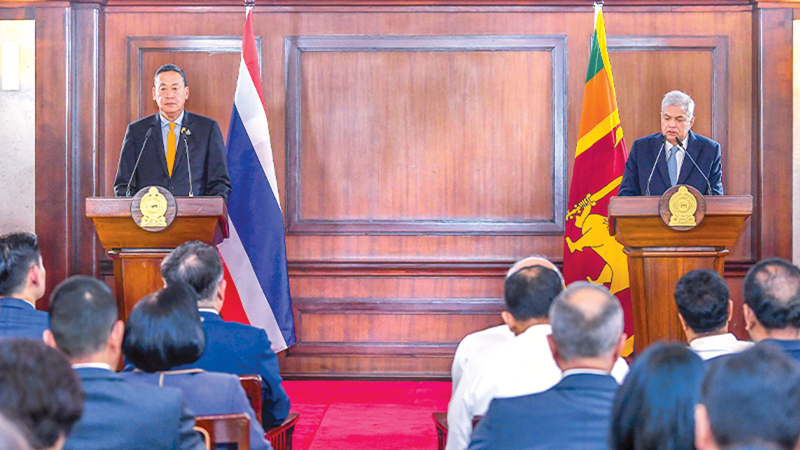The Government’s vision entails elevating Sri Lanka to a high-income status by 2048. Central to this objective are efforts to enhance export earnings through diversification and expansion into new markets, as well as attracting Foreign Direct Investment (FDI) driven by exports.
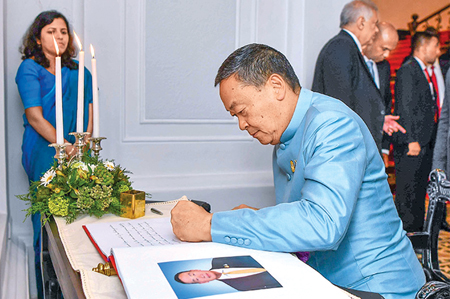
The Thai Premier signs the Golden Book at the President’s House
The Government is intensifying its efforts to bolster economic integration with South Asia, Southeast Asia, and East Asian nations. It is prioritising the establishment of Free Trade Agreements (FTAs) as the preferred mechanism for fostering economic integration with these countries.
In light of this, negotiations for a FTA with Thailand have reached fruition, while discussions with India, Bangladesh, and China are currently in progress. Additionally, trade negotiations with Indonesia and Malaysia are set to commence shortly. Notably, Sri Lanka has submitted a Letter of Intent to become a member of the Regional Comprehensive Economic Partnership (RCEP).
Information on Thailand
Thailand presents convenient access to a substantial market boasting a GDP of US$ 495 billion (as of 2022) and a population of approximately 71.6 million.
According to data from the Sri Lanka Export Development Board (SLEDB), Thailand has emerged as Sri Lanka’s 37th export destination, with a total export value reaching US$ 58.82 million in 2022. Sri Lanka’s main exports to Thailand include ready-made garments, tea, rubber, coconut, gems, electrical components, wheat flour, and activated carbon.
Thailand has implemented restrictions, including tariff quotas, on key exports from Sri Lanka such as tea, pepper, and coconut oil, which are significant contributors to Sri Lanka’s export portfolio.
In light of recognising the economic potential and complementary economic structures that could be developed through enhanced economic cooperation across various sectors, there is an expectation to triple the bilateral trade value between the two countries.
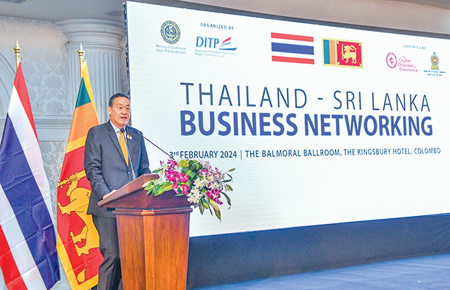
The Thai Premier addressing the Thailand-Sri Lanka Business Networking Summit at the Kingsbury Hotel
The aim is to elevate the trade value from US$ 550 million to US$ 1.5 billion by establishing a Free Trade Agreement (FTA) between Sri Lanka and Thailand. This ambitious endeavour seeks to unlock new opportunities and drive mutual economic growth for both nations.
Negotiation process
During the negotiation process, a feasibility study conducted in 2018 by the University of Colombo assessed the viability of an FTA with Thailand. Findings from the study indicated that such an agreement would bring substantial benefits, particularly fostering growth for Small and Medium Enterprises (SMEs), driving economic development, and enhancing overall social welfare within the country.
According to a 2023 study conducted by the Institute of Policy Studies Sri Lanka (IPS), it is projected that Sri Lanka’s exports to Thailand could surge by 38 percent, while imports from Thailand to Sri Lanka could see a notable increase of 27.8 percent, provided that one side lifts tariffs on the other’s imports.
Additionally, on January 16, 2018, the Cabinet granted approval to the Negotiating Committee to commence negotiations on the FTA with Thailand.
Negotiations on the proposed agreement, comprising 14 chapters along with annexes, commenced in 2018. Over the course of nine sessions, the two countries engaged in extensive negotiations, which progressed steadily. These negotiations culminated during the 9th session from December 8 to 10, 2023.
The proposed Sri Lanka-Thailand Free Trade Agreement (SLTFTA) is extensive in its coverage, encompassing various aspects of trade and economic cooperation. It includes provisions regarding trade in goods, rules of origin, sanitary and phytosanitary measures (SPS), Technical Barriers to Trade (TBT), trade remedies, trade in services, investment, customs procedures and trade facilitation (CPTF), economic cooperation, intellectual property rights, transparency, and dispute settlement. Structurally, the FTA comprises 14 chapters, which encompass the preamble and annexes, outlining the comprehensive framework for bilateral trade relations between Sri Lanka and Thailand.
The progress of the negotiation process was consistently communicated to the Cabinet, ensuring transparency and accountability. The Council of Ministers endorsed Sri Lanka’s negotiating stance. On January 24, 2024, the Sri Lanka Cabinet formally approved the Sri Lanka-Thailand Free Trade Agreement, signifying a significant milestone in the bilateral economic relations between the two countries.
Basic features and benefits of the agreement
Market access and the availability of raw materials and intermediate goods were key considerations.
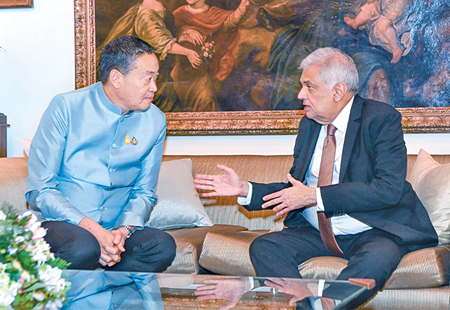
President Ranil Wickremesinghe holding bilateral talks with
Thai Prime Minister Srettha Thavisin
Sri Lanka and Thailand established a 16-year tariff reduction program.
Under this plan, over 15 years, tariffs on 80 percent of goods (Combined Classification Codes) will be phased out in three sequential stages. At the start of the 16th year following the implementation of the tariff relaxation program, duties on 5 percent of the goods (Combined Classification Codes) will be eliminated.
Specified goods
The proposed agreement maintains a duty of 15 percent (Combined Classification Code) on remaining goods, without any elimination or reduction.
Both sides deliberated on granting market access for specified goods, considering items with comparative advantages in each other’s markets, products subject to high tariff rates, and those falling under global quotas.
Ceylon Tea and coconut-related products had obtained duty-free access within the global quota through the expedited process of the Tariff Liberalisation Program (TLP). Moreover, domestic exports such as cinnamon, specific apparel items, fishery products, and rubber-related goods will be exempted from duties during the introductory phase of the tariff liberalisation program.
In 2022, Sri Lanka imported goods totalling US$ 292.68 million, primarily consisting of raw materials and intermediate goods essential for both domestic industries and export-oriented companies. Through the Sri Lanka-Thailand Free Trade Agreement, Sri Lanka has granted early market access to Thai goods, including raw materials and intermediate goods. This move aims to facilitate Sri Lankan manufacturers in acquiring the inputs for their industries at competitive prices, thereby enhancing their competitiveness in the global market. This will make Sri Lanka more competitive in global value chains.
Thai investments
Thailand has become one of the largest foreign investors in the Association of Southeast Asian Nations (ASEAN). In 2021, Thailand’s outward investment amounted to US$ 17.3 billion, reflecting the ongoing expansion of Thai companies’ business activities overseas.
Thai enterprises have been actively investing in and diversifying their operations beyond the ASEAN market, marking a growing trend. Key sectors for foreign investment in Thailand include finance and insurance, food and beverages, wholesale and retail trade, as well as mining. This outward investment trajectory underscores Thailand’s commitment to global economic integration and its pursuit of business opportunities across various sectors and regions.
Employment opportunities
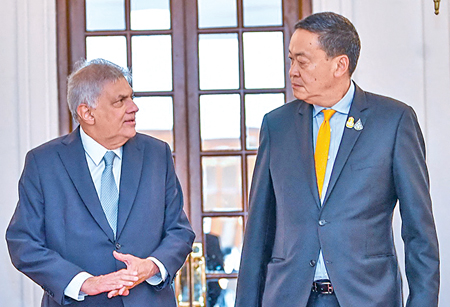
President Wickremesinghe and
Thai Premier Thavisin attending a function
From 2005 to 2022, Thailand has injected over US$ 92 million in FDI into Sri Lanka. Presently, there are 10 commercial investment projects operational in Sri Lanka, generating over 600 employment opportunities.
Consequently, the Sri Lanka-Thailand Free Trade Agreement is anticipated to streamline, encourage, and safeguard foreign investment, further fostering economic collaboration between the two nations.
Under the Sri Lanka-Thailand Free Trade Agreement, Sri Lanka anticipates attracting Thai investments in various manufacturing sectors, including electrical and electronics, auto parts, processed food, apparel, and pharmaceutical products. There are expectations of increased investment in tourism, Information Technology (IT), and logistics.
Moreover, with the implementation of the Sri Lanka-Thailand Free Trade Agreement, which opens a sizable market for Sri Lanka, it is anticipated that this will stimulate investments from third-party countries into Sri Lanka. This expanded market access and improved trade environment are likely to create more opportunities for foreign investors to engage in Sri Lanka’s growing economy.
Joining the global value chain and special rules applicable to imports of goods from third-party countries:
Sri Lanka and Thailand will gain market access to each other’s markets based on agreed-upon criteria regarding rules of origin, which have been negotiated considering stakeholders’ interests and various other factors.
This measure is anticipated to bolster the global value chain while also addressing the influx of goods into Sri Lanka from third-party countries with insufficient processing.
For non-originating materials (goods from third-party countries), the general rule and Qualifying Value Content (QVC) stipulate a minimum of 40 percent, or as agreed upon, based on a change in tariff classification at the four-digit level of flexible composite classification codes.
Hence, goods originating from a third-party country must exhibit a minimum of 40 percent qualifying value content (equivalent to at least a 40 percent value addition) to qualify for entry into Sri Lanka under tariff concessions. Specific criteria have been established for certain products to ensure mutual benefit for both Sri Lanka and Thailand. This arrangement is expected to provide Sri Lanka with an additional advantage in its pursuit of accession to the RCEP.
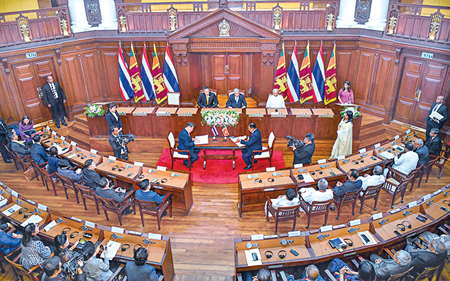
The bilateral agreements being signed at
the Presidential Secretariat
The liberalisation of trade in services will proceed concurrently with the ongoing unilateral liberalisation efforts and in accordance with domestic laws and regulations.
The liberalisation of trade in services aims to establish clear and transparent commitments regarding the level of liberalisation.
This liberalisation aligns with existing unilateral efforts and adheres to domestic laws and regulations, ensuring consistency and legality in the process.
Independent movement of individuals has been restricted, except in contexts aimed at facilitating investment in the service sector of the country.
Measures
The Agreement allows each party to implement measures regulating the entry of individuals from the other party into its territory, except in cases where such measures are designed to minimise the benefits to the other Party under the provisions of this Chapter.
Facilitating Sri Lankan exporters by promoting cooperation on standards, technical regulations and conformity assessment procedures
The Sri Lanka-Thailand Free Trade Agreement (FTA) aims to streamline access for Sri Lankan exporters into the Thai market. It is designed to foster collaboration on standards, technical regulations, and conformity assessment procedures, with a focus on overcoming technical barriers to trade. By doing so, the FTA enables Sri Lankan exporters to navigate and comply more efficiently with Thai standards, thereby facilitating smoother trade between the two countries.
The Sri Lanka-Thailand Free Trade Agreement (FTA) provides the opportunity to engage in negotiations for Mutual Recognition Agreements (MRAs). These agreements can streamline conformity assessment procedures by minimising the necessity for redundant testing and certification processes.
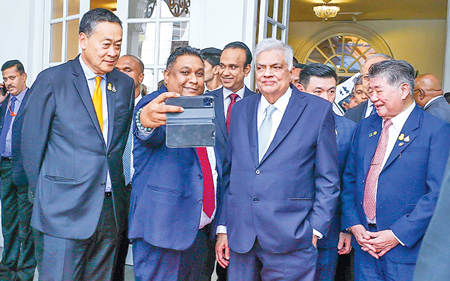
Thai and Sri Lanka business executives take a selfie
with the two leaders
Under the Sri Lanka-Thailand Free Trade Agreement, there is flexibility in marking and labelling requirements. Alternative labelling methods such as electronic labels, non-permanent or detachable labels, or labelling of ingredients packaged with the product are accepted. This flexibility ensures ease of compliance for exporters.
Moreover, technical discussions facilitate Sri Lankan exporters in resolving any issues they may encounter, ensuring timely solutions and fostering smoother trade between the two countries.
Technical and expert assistance and knowledge exchange related to trade with Thailand through 11 identified sectors:
For 11 sectors identified through economic cooperation between the two countries, Sri Lanka will receive technical and expert assistance from Thailand.
The Sri Lanka-Thailand Free Trade Agreement covers a broad spectrum of sectors, encompassing trade and investment promotion (including export development), infrastructure (including transportation and port sectors), agriculture and agribusiness, fisheries, gems and jewellery, tourism, small and medium enterprises (SMEs) and micro, small and medium enterprises (MSMEs), financial cooperation, packaging industry, information and communication technology (ICT), and technical and vocational education and training.
The Sri Lanka-Thailand Free Trade Agreement is anticipated to facilitate the exchange of knowledge concerning trade.
Thailand, with ambitions to rank among the top 30 countries in the Global Innovation Index by 2030, seeks to enhance economic and technological cooperation with Sri Lanka. This collaboration will provide support to Sri Lankan startups, fostering innovation and entrepreneurship within the country. It is also expected to eventually facilitate visa-free travel between both countries for their citizens.
The FTA, a bilateral Air Services Agreement and several other pacts were signed during Thai Premier Srettha Thavisin’s official visit to Sri Lanka for the 76th Independence Day celebrations.





